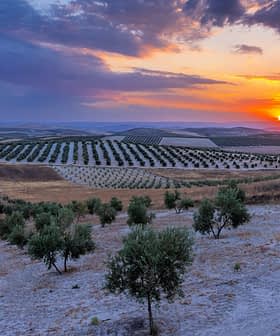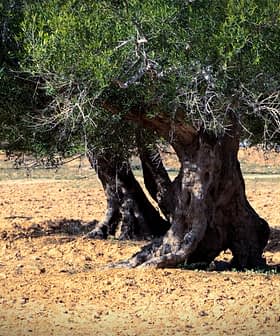Andalusian Officials Withdraw Sea of Olives Candidacy for UNESCO Recognition
The move came after 8,500 olive growers signed a petition protesting the candidacy. However, some are hopeful the decision will be overturned.
 Olive grove landscapes of Andalusia
Olive grove landscapes of Andalusia Spanish representatives have decided to withdraw the candidacy of the Olive Grove Landscapes of Andalusia from contention for UNESCO World Heritage Site status due to concerns from local olive growers, despite previous efforts from institutions and stakeholders to secure the nomination over the past decade. The decision was met with celebration from farmers’ unions and cooperatives, who believe that the UNESCO listing would bring unnecessary regulations and limitations to their agricultural practices, while others, including Spain’s minister of agriculture, hope for the revival of the proposal in the future.
With two months until the 46th session of the UNESCO World Heritage Committee in India, Spanish representatives have voted to withdraw the candidacy of the Olive Grove Landscapes of Andalusia.
This decision to remove the iconic 1.5 million hectare landscape, also known as Mar de Olivos, or Sea of Olives, from contention to enter the UNESCO World Heritage Sites list followed a petition signed by about 8,500 olive growers in Jaén.
Subsequently, the Commission of the Olive Grove Landscapes in Andalusia, comprising local institutions and other stakeholders, officially dropped the candidacy first presented nearly a decade ago.
See Also:Traditional Turkish Olive Cultivation Practices Recognized by UNESCO“We cannot proceed against the farmers’ wishes,” said Francisco Reyes, president of the province of Jaén and chair of the commission.
Local universities and foundations, in collaboration with agricultural unions and the provincial governments of Jaén, Córdoba, Sevilla and Málaga, have been working on the nomination since 2016.
If approved, the Sea of Olives would have become Andalusia’s ninth and Spain’s 50th world heritage site. Only Italy and China are home to more sites.
However, many farmers opposed the candidacy, concerned that UNESCO status would burden them with additional regulations and hinder their business profitability.
Asaja Córdoba, a farmers’ union, and other regional cooperatives celebrated the decision to withdraw the candidacy.
“Our previous experience from similar situations indicated that [the UNESCO listing] would end up weighing on the farmers,” Ignacio Fernández de Mesa, the association’s president, told Olive Oil Times. “Given the current regulations from the E.U.‘s Common Agricultural Policy and other sector-specific laws, there is no need for additional protections or limitations.”
“The proposal would unnecessarily freeze our agricultural practices, complicating any agronomic adaptations needed due to globalization,” he added. “We see no benefit in the UNESCO listing, leading us to reject this initiative completely.”
Previously, a spokesperson for Spain’s Ministry of Culture and Sport disputed these kinds of claims and told Olive Oil Times that other UNESCO World Heritage sites, such as France’s Champagne region and Italy’s Prosecco region, still have functioning vineyards, where producers profitably meet the UNESCO criteria while making wine.
However, Asaja Córdoba countered that UNESCO recognition is unnecessary for Spaniards and the rest of the world to appreciate the work done over decades by local growers.
The association reports that the olive groves are in excellent condition, with thriving biodiversity. “Their enormous efforts are aimed at maintaining a magnificent state of conservation for their areas,” Fernández de Mesa said.
He added, “This has been achieved over the years thanks to the good practices of farmers, livestock breeders, foresters and rural landowners.”
Despite the latest decision, many advocate for the candidacy’s revival, including Luis Planas, Spain’s minister of agriculture, fisheries and food, who said the withdrawal would be “temporary.”
“I hope we can put [the proposal] back on the table as it would be a significant achievement for the whole [olive] sector while also a token of the unique appeal of our territory,” said Planas while noting that the project’s responsibility is entirely in the hands of its promoters.
The University of Jaén, which has worked closely with the promoters of the candidacy, asked farmers not to miss out on “an opportunity for the province Jaén and the whole of Andalusia.”
“We do not consider the matter closed,” said Nicolás Ruiz Reyes, the university’s rector. “On the contrary, we are open to resuming it as soon as favorable circumstances arise.”
One of the first reactions to the withdrawal came from Cristóbal Cano, secretary general of the Union of Small Farmers and Ranchers (UPA) in Jaén.
Cano criticized “misinformation, disloyalty within the sector, and political interference” for the candidacy’s failure. Referring to the commission’s vote, he noted that “this is a decision we’ll regret.”
Share this article









